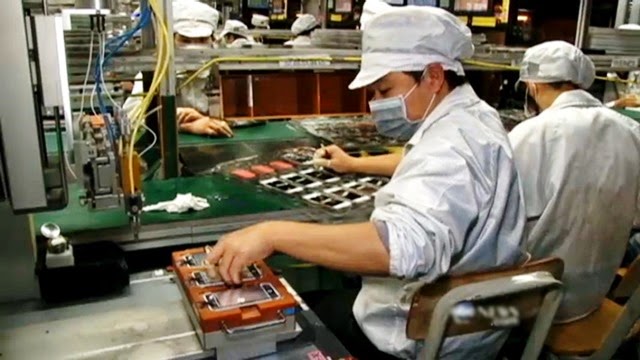China-made Phones: harmless or not?
China-made telecommunications equipment, especially China-made cellphones have reached Manila's shores. And People may take interest due to their cheapness, while others rather abhor for their sinophobic sentiments if not for the cellphones being just ripoffs of some much well-known products. Will these manufacturers take the risk and the appraisal from their new customers?
Two Chinese telecommunication manufacturers, Huawei and Xiaomi, have entered the Philippine market with their cheap China-made cellphones and other telecommunication devices.
Huawei is known for its tablet distributed by PLDT, Smart Telecommunications, and Globe Telecom. The company is targeting to increase its market share in the country’s smartphone market by five-fold over the next three years, banking on its high quality and competitively-priced products. As Gavin Dai, Huawei Technology Philippines chief executive officer said, the company is looking at gradually increasing its market share in the Philippines to about five percent next year, and to 10 percent in 2015 from the current share of less than two percent.
On the other hand, Xiaomi, a newcomer in the Philippine cellphone market, has cited the country as the 3rd from its 10 retail markets outside of “Greater China", and has opened last April its Facebook page, featuring its new MI3 that also uses Android just like its other competitors. The company took on the global brand name "MI" back in April, and launched it in Singapore and Malaysia in February and May, respectively. It has its sights set on 10 countries this year that include Brazil, India, Indonesia, Mexico, Russia, Thailand, Turkey, and Vietnam, with an ambitious 60 million unit sales target for 2014, from the 18.7 million it sold last year.
Both manufacturers are known for their competitively-priced high-end smartphones, their unique implementation of the Android operating system, and even the growing number of their customers who prefer cheap yet cool gadgets regardless of where it came from.
However, in spite of these, some Asians, especially Filipinos choose not to cater to the cheapness of China-made phones, especially those who have security reasons after turbulent events surrounding Philippines and China, if not because they're cheap imitations or even fake, smuggled goods. In fact, there are even anti-China pages made in Facebook calling for a boycott of Chinese-made goods, whether is it because of being a cheap imitation if not an espionage tool supporting Chinese expansionist interests, as well as propagating hysteria about Huawei being used for espionage in the United States by the military. The CIA, under its former administrator Michael Hayden, has investigated Huawei on its possibility as a tool of China for espionage, and they have found relevant information regarding the company-founder Ren Zhengfei.
Zhengfei has been linked to the People's Liberation Army as its former soldier, and an engineer in its Information Technology Research Department, until his retirement in the early 1970's, after which he imported Hong Kong-made telecommunications equipment before he eventually shifted to manufacturing. Based on the gathered information, Zhengfai has also joined the Communist Party of China in 1978 during the era of Deng Xiaoping and his 5 modernizations; thus showing how capitalists can become "communists" as well. He has been a representative of private entrepreneurs, after being elected as a member of the 12th National People's Congress.
Meanwhile, Xiaomi had been a ripoff of an American-owned company, as it tries to imitate Apple and with its founder, Lei Jun, imitating the late Steve Jobs, especially when it comes to showing new gadgets complete with getup and casual introductions. Its current flagship, the MI3, is currently one of the fastest Android smartphones beating out the HTC One (M8) in recent tests. Also, another of their famous products is an Android-powered tablet which is reminiscent of the iPad mini, but with a color palette similar to that of the iPhone 5c. Critics however, stated that Xiaomi's low-price gadgets are merely cheap iPhone imitations that have no significant software nor hardware advantages. They also said that the company faces stiff challenges from its imitatee, particularly Apple and Samsung, which are also in the position to offer low-price smartphones.
But Despite the controversies and criticisms surrounding China-made gadgets and their manufacturers, there are still people who choose these products, as they prioritize cheapness over quality and origin when buying cellular phones and tablets. Some are even excited about the possible price of Xiaomi's latest MI3 after the company's soft opening in the Philippines. After all, for the owners, what they care about is their interest especially regarding their top of the line products which significantly aided their companies Xiaomi and Huawei to bloom in the international scene, in spite of whatever allegations they face, and their rigid competion with other brands in the first world countries such as Canada's Blackberry and Finland's Nokia which nowadays are known as Microsoft Mobile.
In actuality, China's export processing zones do assemble Apple's IPhone even if designed in the U.S., while local brands in the country like MyPhone and Cherry mobile are actually imports from China and even India. Newcomers in our market especially Chinese, take appraisal for the affordability of their tablets and cellphones, while they have to appease their customers that these products are no-espionage equipment and are neither fake nor risky as Sinophobes continue to speak of. Ironically, these accusers come from a country that also manufactures what the West satisfies and local cellphone brands import. The Philippines has the capacity to develop its own telecommunications equipment instead citing factories capable of manufacturing semiconductors and semiprocessed goods used in assembling telecommunications equipment, and it takes both enough will and time to create foundations to make a Filipino-made phone as an alternative to importing Chinese or Indian ones.
Quite possibly, but it is just up to the people whether they consider buying these devices, both from "Red China" and "Taiwan" or not.



.jpg)

